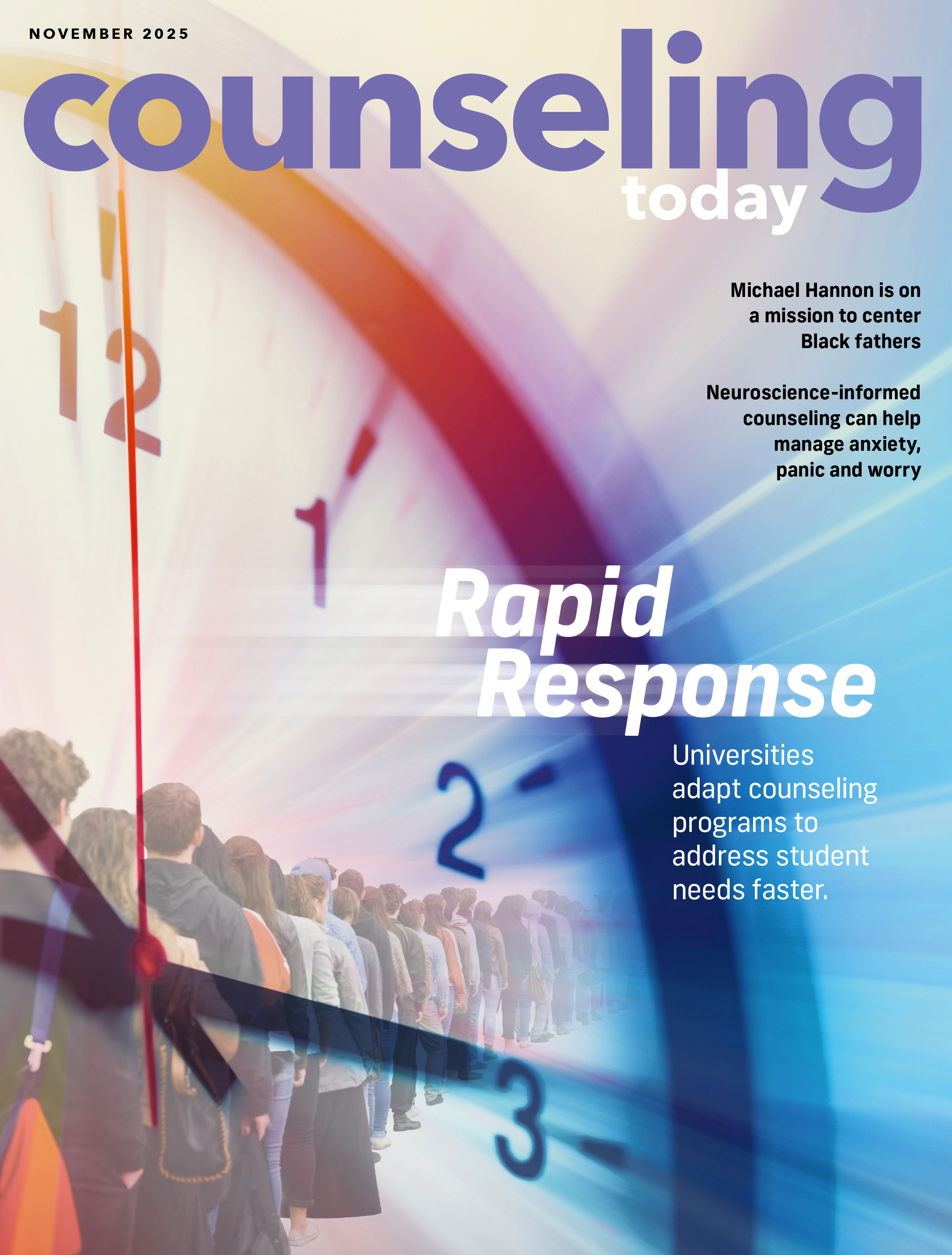The Fraud Factor
By Christine Yu
January 2024

Photo Credit: Illustration by Stefania Infante
When Ayanna Harley, PLPC, started her master’s degree in clinical rehabilitation and counseling at Louisiana State University, it had been 10 years since she had last been in the classroom, as an undergraduate student. She was also the oldest person in her program and the only person of color.
Despite having similar credentials as her classmates, Harley doubted herself and whether she was qualified for her graduate program: “Is this the right career choice for me? Am I too old for this? Do I belong here?” As the doubts chipped away at her self-confidence, she felt she had to work harder, overprepare and excel in her courses to prove she deserved her spot in the program.
Looking back, Harley recognizes that she was experiencing imposter syndrome, that pervasive feeling of being a fraud. “None of the other students were concerned that I was the eldest or the only person of color,” she says. “These were things that I was questioning and thinking about. I was in competition with myself.” Even now, as a new professional practicing in Louisiana, Harley still finds herself doubting her abilities as a counselor. “These are real human beings seeking help,” she says. “Sometimes I don’t know what to do.”
Harley is hardly alone in second-guessing herself and her abilities. “It’s part of the human experience,” says Francisca Mix, LPC, CEO and founder of Francisca Consulting and Counseling in Colorado. “There’s a negative core belief that gets triggered — the question of ‘Am I enough? Is this good enough?’ — especially when we’re learning something new.”
The Fraud Police
While it’s not listed in the Diagnostic and Statistical Manual of Mental Disorders, imposter syndrome is a common phenomenon. “It is self-doubt ramped up,” says Laura Smestad, PhD, LMHC, who’s based in Washington. “It boils down to this fear that I’m not actually enough as I am, that I’m going to fail, that I have somehow convinced everyone that I’m competent, but they don’t know the truth and I’m afraid people are going to find out.”
This critical voice surfaces despite a track record of accomplishments. “Imposter syndrome distorts your perception of reality and how you’re doing. You don’t see your own achievements,” explains Michael Drane, PhD, LMHC, whose doctoral dissertation examined the experience of imposter syndrome among counselor education and supervision students.
The term “imposter syndrome” was first coined in 1978 as “the imposter phenomenon” by psychologists Pauline Rose Clance, PhD, and Suzanne Imes, PhD. Their research focused on the experience of high-achieving women. They found that the imposter feeling can be caused by family dynamics such as when women were compared to a sibling who was considered smarter.
“That inferiority in childhood causes you to overcompensate and develop unrealistically high expectations of yourself. You’re trying to outrun that feeling of incompetence,” Drane says. In other cases, women who their parents deemed as the exceptional one in the family felt like a fraud. They didn’t necessarily trust their parents’ steadfast belief in them.
Clance and Imes’ seminal study led to research with additional populations. Soon, others found evidence that the crippling sense of self-doubt wasn’t unique to women. Men experienced it too, and it was found in people across disciplines, including health care, STEM, education and business. A 2020 systematic review, published in the Journal of General Internal Medicine, found the prevalence of imposter syndrome as high as 82%. “It can affect anyone stepping into a new role or who has new responsibilities,” Drane says. This includes counseling students and new counselors.
And that feeling of being an imposter doesn’t disappear once you gain more experience. While it makes sense to feel unsure when you’re starting your practicum, for example, the feeling doesn’t always dissipate as you rack up achievements.
“I had imposter syndrome about this interview,” admits Smestad, who has been practicing for 10 years. “My immediate reaction was ‘Why me? I better prepare because otherwise they’re going to find out I don’t know anything about imposter syndrome,’ even though I’m actually qualified. I’ve presented on this. I’ve done a podcast on this.”
The Impact of Imposter Syndrome
The feeling of constantly being on the lookout for the fraud police can be exhausting. It can lead to experiences of anxiety, depression, exhaustion, perfectionism and procrastination. But more than that, imposter syndrome can have a real impact on personal and professional development and career opportunities.
Imposter syndrome can stunt skill development. Students end up turning down new opportunities because of the perceived risk of failing when stepping outside their comfort zone. Anna Flores Locke, PhD, LPC, owner and mental health and infertility counselor at Charlandra Consulting and Counseling Services in New Jersey, sees how some students choose not to pursue research and writing because they don’t believe they’re good enough. Locke says that can snowball into turning down opportunities to present at conferences and shying away from networking and leadership opportunities, ultimately slowing their academic and professional growth.
Similarly, when new counselors don’t acknowledge areas where they might be struggling, it can hinder counseling skill development. “You can’t be a counselor without competencies in your skills. You have to practice those skills,” says Locke, an approved clinical supervisor.
There’s also a connection between imposter syndrome and burnout. When people feel like a fraud, they may work overtime to prove they are qualified, both to themselves and those around them. As a result, students and new counselors can deplete their emotional, mental and physical reserves in ways that can affect not only their well-being but their work with clients. “It’s compassion fatigue. It’s a lower self-concept. All those things will lead to burnout,” Harley says. In some cases, people have dropped out of graduate programs or have left the profession.
The Role of Supervisors and Mentors
One critical area where imposter syndrome shows up is in clinical supervision. It makes sense: New counselors want their supervisor to see them as competent. They may also compare their skills and abilities to their supervisor, whether consciously or subconsciously, despite their supervisor’s longer tenure in the field. Plus, there’s a power differential between supervisors and those starting off in the profession. How can new counselors have an open dialogue with their supervisor about the challenges they face when they’re being evaluated?
“Clinical supervision is powerful, and it really is on the supervisor to nurture trainees and co-create a container where it’s normal to feel these feelings,” says Mix, an approved clinical supervisor and board-certified dance/movement therapist. “How a supervisor speaks to this point directly truly does soften the pressure and the fear of ‘I’m being evaluated and I can’t be honest.’ It supports their process of finding the courage to speak to the more challenging topics while stepping further into the shoe of a clinician.”It’s through this supervisor-supervisee relationship that new counselors can begin to move through their feelings of unease and intentionally develop self-confidence. Supervisors and mentors can help new counselors reflect back their experiences and flush out their doubt. “You help them work that edge and intentionally develop self-confidence,” Mix says.
Mix says her role is also to highlight the predictable experiences new counselors can expect in the first three months, six months, nine months and beyond. “Orienting new trainees to potential experiences allows for a more open conversation about their self-doubt and struggles in those experiences,” she says. In doing so, supervisors reassure their supervisees that they are on track and there is a path forward.
Reframing Imposter Syndrome
While imposter syndrome can be a universal experience, who does — or doesn’t — second-guess their abilities is more than a matter of self-confidence. “It’s part of the systemic oppression and living in a racist society. To maintain racism is to make one group feel inferior,” Locke says.
Research suggests that people from marginalized groups experience imposter syndrome at higher rates. Locke says imposter syndrome is especially common among colonized ethnic groups because they’ve been taught to be submissive. “There’s an element of: ‘You’re not entitled’ or ‘You should be grateful to have a seat because someone else can take it from you if you make a mistake,’” she says. It can feel particularly acute if no one else in the room looks like you or you’ve experienced microaggressions, which sends the subconscious message that you’re not good enough.
For instance, growing up Puerto Rican in a working-class home, Locke, who is an award-winning author, never believed she could be a writer. “Puerto Ricans are a colonized ethnic group. Because of that, we were limited in the education we received. There were language barriers and a generational belief that we were inferior, which carried over into my upbringing,” she says. She, in turn, developed an internal belief system that told her writing wasn’t for her. It was a luxury afforded to other people. “It wasn’t for us,” she says.
Locke felt that straying outside of her culture’s norms would be a betrayal of her family and disrupt the status quo. “For me, it created a sense of shame,” she says, which then fueled her imposter syndrome.
When Locke contextualizes imposter system as a systemic issue, it helps her students and supervisees understand that their experience isn’t unique to them. “It’s something that happens across the board in our communities because of how we’ve been colonized, oppressed and told we’re inferior,” she says. “That helps them a lot.”
Quieting the Imposter Voice
Humans tend to focus on the negative, which only feeds the imposter within. But there are strategies that can help reframe the inner critic.
Rather than focus on the bad, Harley makes a point to look for evidence of success and keep track of it. Then, when the next bout of imposter syndrome strikes, she’s armed with examples of how she’s succeeded in the past. It also allows her to be more transparent with herself about her own journey from graduate student to practicing counselor and ultimately to licensed professional counselor.
Locke has cultivated her own personal “dream team,” trusted people in her life who can be a sounding board and offer support when doubt strikes.When confronted with feelings of being an imposter, Smestad reminds herself that it’s a fear-based response. Instead of making a decision based on fear, she considers whether her reactions and decisions align with her values. For instance, if she’s asked to present at a conference and notices that she’s shying away from the opportunity, she asks herself if she genuinely isn’t interested or if she’s afraid she’s going to mess up. “Doing it from that lens takes it one step deeper,” she says.
Drane believes that graduate programs should incorporate discussions about imposter syndrome during orientation. “Normalize that you’re not supposed to know what you’re talking about yet. Have the professors, the ones who are supposed to be the experts, share what they’ve been through,” he says.
“The No. 1 thing we can do is recognize it and normalize it,” he says. Through his doctoral studies, Drane realized that the colleagues he was intimidated by felt the same way he did. “If we had just had a conversation about this in the beginning, we could have supported each other this whole time instead of being intimidated by each other.”


